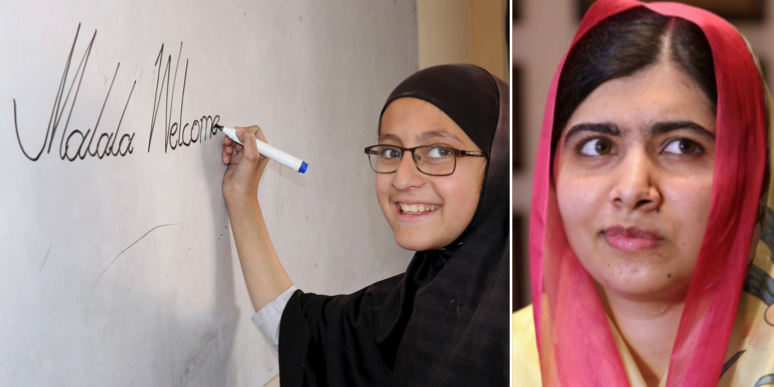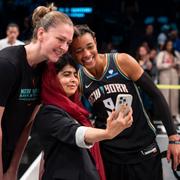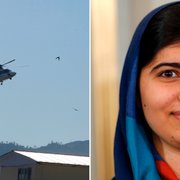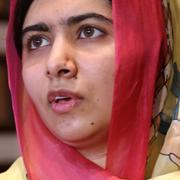Wikipedia (en)
Malala Yousafzai (Malālah Yūsafzay: Urdu: ملالہ یوسفزئی; Pashto: ملاله یوسفزۍ [məˈlaːlə jusəf ˈzəj]; born 12 July 1997) is a Pakistani activist for female education and the youngest Nobel Prize laureate. She is known for human rights advocacy, especially the education of women and children in her native Swat Valley in Khyber Pakhtunkhwa, northwest Pakistan, where the local Taliban had at times banned girls from attending school. Her advocacy has grown into an international movement, and according to the Prime Minster of Pakistan, she has become "the most prominent citizen" of the country.
Yousafzai was born in Mingora, Khyber Pakhtunkhwa, Pakistan. Her family came to run a chain of schools in the region. Considering Jinnah and Benazir Bhutto as her role models, she was particularly inspired by her father's thoughts and humanitarian work. In early 2009, when she was 11–12, she wrote a blog under a pseudonym for the BBC Urdu detailing her life during the Taliban occupation of Swat. The following summer, journalist Adam B. Ellick made a New York Times documentary about her life as the Pakistani military intervened in the region. She rose in prominence, giving interviews in print and on television, and she was nominated for the International Children's Peace Prize by activist Desmond Tutu.
On 9 October 2012, while on a bus in Swat District after taking an exam, Yousafzai and two other girls were shot by a Taliban gunman in an assassination attempt in retaliation for her activism; the gunman fled. Having been hit with a bullet in the head, she remained unconscious and in critical condition at the Rawalpindi Institute of Cardiology, but her condition later improved enough for her to be sent to the Queen Elizabeth Hospital in Birmingham, UK. The murder attempt sparked a national and international outpouring of support for Yousafzai. Deutsche Welle wrote in January 2013 that she may have become "the most famous teenager in the world". Weeks after the attempted murder, a group of fifty leading Muslim clerics in Pakistan issued a fatwā against those who tried to kill her. Taliban officials responded to condemnation by further denouncing Yousafzai, indicating plans for a possible second assassination attempt which they justified as a religious obligation. Their statements resulted in further international denunciation.
Following her recovery, Yousafzai became a prominent activist for education. Based out of Birmingham, she founded the Malala Fund, a non-profit organisation, and in 2013 co-authored I am Malala, an international bestseller. In 2012, she was the recipient of Pakistan's first National Youth Peace Prize and the 2013 Sakharov Prize. In 2014, she was the co-recipient of the 2014 Nobel Peace Prize, along with Kailash Satyarthi, for her struggle against the suppression of children and young people and for the right of all children to education. Aged 17 at the time, she became the youngest-ever Nobel Prize laureate. In 2015, Yousafzai was a subject of the Oscar-shortlisted documentary He Named Me Malala. The 2013, 2014 and 2015 issues of Time magazine featured her as one of the most influential people globally. In 2017, Yousafzai's children's picture book Malala's Magic Pencil was published. From 2013 to 2017, she was a pupil at the all-girls Edgbaston High School in Birmingham. In 2017, she was awarded honorary Canadian citizenship and became the youngest person to address the House of Commons of Canada. In August 2017, she gained admission to Lady Margaret Hall, Oxford to study for a bachelor's degree in Philosophy, Politics and Economics (PPE).



